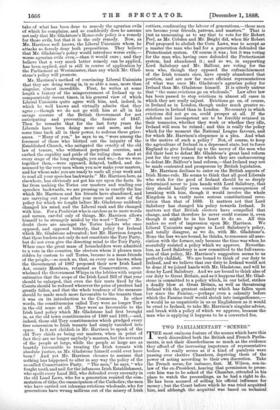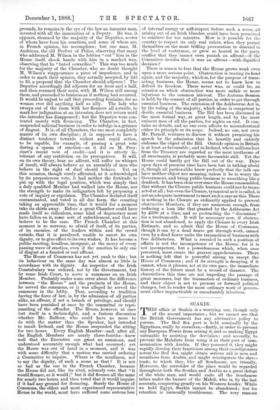TWO PARLIAMENTARY "SCENES."
THE most ominous feature of the scenes which have this week discredited both the British and French Parlia- ments, is not their disorderliness so much as the evidence they afford of the increasing impotence of representative bodies. It really seems as if a kind of paralysis were passing over elective Chambers, depriving them of the power of acting according to their own discretion. Take the French scene, for instance, first. M. Wilson, son-in- law of the ex-President, hearing that permission to prose- cute him was to be asked of the Chamber, attended in his place to watch the proceedings, as he had a right to do. He has been accused of selling his official influence for money ; but the Court before which he was tried acquitted him, and although the acquittal was based on technical grounds, he remains in the eye of the law an innocent man, invested with all the immunities of a Deputy. He was, it appears, shunned by the majority of the Deputies, scores of whom have been his courtiers, and some of whom are, in French opinion, his accomplices ; but one man, M. Andrieux, the old Prefect of Police, observing that many who addressed M. Wilson in the lobbies "cut" him in the House itself, shook hands with him in a marked way, observing that he "hated cowardice." This was too much for the majority of the Chamber, who no doubt thought M. Wilson's reappearance a piece of impudence, and in order to mark their opinion, they actually accepted, by 345 to 30, a proposal that the Chamber should adjourn ! The Deputies accordingly did adjourn for an hour and a half, and then resumed their seats, with M. Wilson still among them, and proceeded to business as if nothing had occurred. It would be unjust to call that proceeding feminine, for no woman ever did anything half so silly. The lady who sweeps out of the room with her flounces all a-rustle, to mark her indignation at an intrusion, does not return until the intruder has disappeared ; but the Deputies were con- tented merely with flouncing. The Chamber, in fact, suspended national business in order to indulge in a grimace of disgust. It is, of all Chambers, the one most completely master of its own discipline ; it is supposed to have a distinct tendency towards violent and rapid action, to be capable, for example, of passing a great vote during a spasm of emotion—as it did on M. Frey- cinet's recent vote of credit—and it is utterly in- tolerant of any restriction on its prerogatives. It will, on its own theory, bear no affront, will suffer no whisper of insult, will always behave as an assembly of men who believe in the right of duel should behave. Yet on this occasion, though sorely affronted, as it acknowledged by its preposterous vote, it had neither the fortitude to put up with the legal position, which was simply that a duly qualified Member had walked into the House, nor the strength to make its indignation felt by proposing a vote of inquiry or expulsion. The Chamber declared itself contaminated, and voted, in all due form, the counting taking an appreciable time, that it would for a moment take its skirts away. Before a great Chamber could have made itself so ridiculous, some land of degeneracy must have fallen on it, some sort of enfeeblement, and that we believe to be the case. The French Chamber at this moment is so nervous, so afraid of itself, of its parties, of its enemies, of the leaders within and the crowd outside, that it is paralysed, unable to assert its own dignity, or to give effect to its own wishes. It has become a public meeting, headless, inorganic, at the mercy of every passing wave of emotion, even if the emotion be only one of disgust at a fancied or real affront.
The House of Commons has not yet sunk to this ; but its behaviour on the same day was almost as little in accordance with its dignity. An inspector of the Irish Constabulary was ordered, not by the Government, but by some Irish Court, to serve a summons on an Irish Member. Probably under some error about the difference between "the House" and the precincts of the House, he served the summons, or it was alleged he served the summons in the lobby. That, according to tradition having the force of law, is, by the admission of all parties alike, an affront, if not a breach of privilege, and should have been punished at once by the committal or repri- manding of the offender. The House, however, at once lost itself in a faction-fight, and a furious discussion whether Mr. Balfour, who could have no more to do with the matter than the Speaker, had intended to insult Ireland, and the House suspended the sitting for two hours. Every English Member—and, after all, the English Members are nearly three-fourths—knew well that the Executive can grant no summons, and understood accurately enough what had occurred ; yet the House was out of hand in a moment, and it was with some difficulty that a motion was carried ordering a Committee to inquire. Where is the manliness, not to say the dignity, of such a scene as that ? It is not so bad as the one in the French Chamber, because the House did not, like its rival, solemnly vote that "it would flounce, so it would ;" but it did flounce all the same for nearly two hours, and then voted that it would inquire if it had any ground for flouncing. Surely the House of Commons, the oldest and most experienced representative House in the world, must have suffered some serious loss of internal energy or self-respect before such a scene, all arising out of an Irish blunder, could have been permitted to continue for ten minutes. How is it possible for the country to respect its only real rulers, when they permit themselves on the most trifling provocation to descend to the level of vestrymen, or grow so heated in the party conflict that they cannot even punish an affront—if the Committee decides that it was an affront—with dignified. decision ?
There is reason to fear that the House grows weak even upon a more serious point. Obstruction is rearing its head again, and the majority, which is, for the purpose of trans- acting business, the House, seems not to know how to defend its freedom. There never was, or could be, an occasion on which obstruction was more unfair or more injurious to the common interest. The Autumn Session is held, by the consent of all parties, in order to get through essential business. The extension of the Ashbourne Act is, by the ruling of the majority, which alone is competent to decide, essential business. The Bill has been discussed in the most formal way, at great length, and by the most eminent men of all the parties, for nights on end. It con- tains no details, and no one even affects to misunderstand either its principle or its scope. Indeed, no one, not even Mr. Parnell, ventures to discuss it without premising his. speech by the admission that he heartily and entirely endorses the object of the Bill. Outside opinion in Britain is at least as favourable ; and in Ireland, where millions lent from the Treasury are regarded as the most toothsome of all sweetmeats, is probably more favourable still. Yet the House could hardly get the Bill out of the way. Days upon days of precious time have been lost in talking about it, though all parties alike know perfectly that the talk can have neither object nor meaning, unless it be to worry the Government, and bring public business to something like a deadlock. It has been clear ever since the House reassembled, that without the Closure public business could not be trans- acted at all ; but even the Closure, tyrannical as it is called, is not an adequate instrument to meet such a case as this. There' is nothing in the Closure as ordinarily applied to prevent obstructive Members, if they are numerous enough, from reducing a loan like that granted by the Ashbourne Act by £500 at a time, and so protracting the " discussion " for a twelvemonth. It will be necessary now, if obstruc- tion is not abandoned, to apply the Closure to every Irish Estimate, and so admit that the House of Commons, though it can by a dead heave get through work, cannot even by a dead heave unite the transaction of business with free deliberation. What is revealed in such a position of affairs is not the incompetence of the House, for it is not incompetent, but a powerlessness which, when once perceived, must create the gravest apprehensions. There is nothing left that is powerful among us except the House of Commons ; and if its strength is decaying, if it cannot, when it pleases, act at its own pace, the immediate history of the future must be a record of disaster. The obstructives this time are not impeding the passage of great measures, but the transaction of ordinary business, and their object is not to prevent or forward political changes, but to render the most ordinary work of govern- ment either impracticable or unendurably laborious.











































 Previous page
Previous page